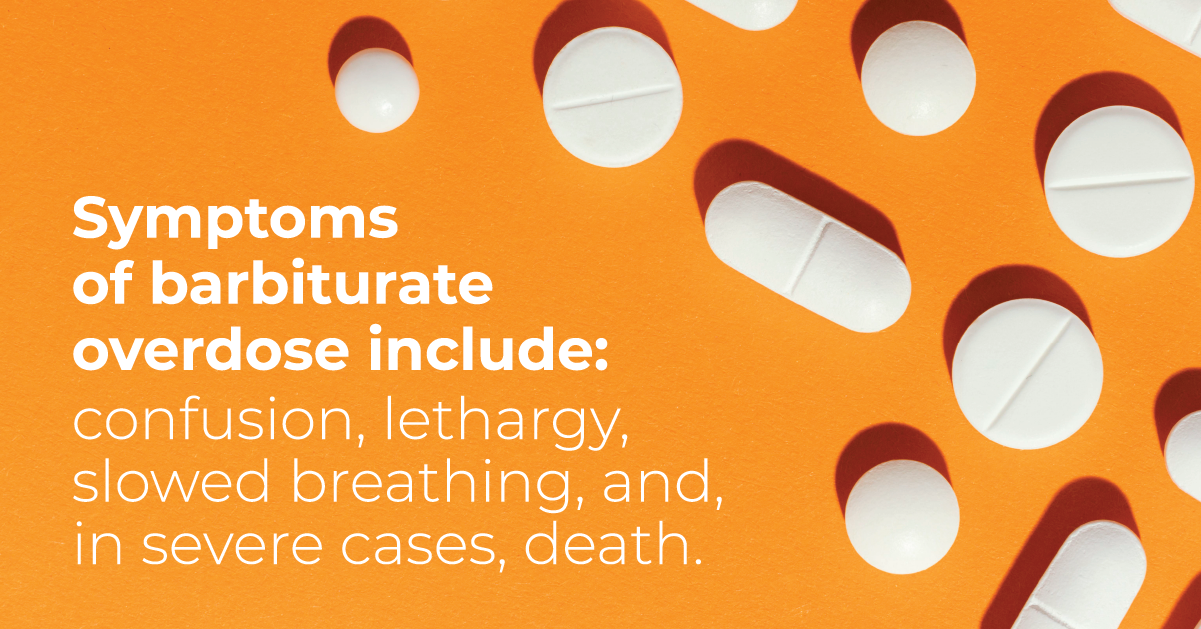The Danger of Barbiturate Overdose
Barbiturate overdose occurs when an individual ingests an excessive amount of barbiturate medications, a class of central nervous system depressants. These drugs are prescribed for various medical conditions, such as insomnia, anxiety, and seizures. However, misuse or accidental ingestion of too much can lead to a potentially life-threatening situation.
Understanding the symptoms, risks, and preventive measures is important for healthcare professionals and the public to address this potentially life-threatening situation effectively.
Key Takeaways
Barbiturate overdose and addiction can occur when individuals misuse these drugs, taking them in larger amounts or more frequently than prescribed. Here’s what you need to know:
- Barbiturate overdose can lead to life-threatening respiratory depression and central nervous system suppression.
- Symptoms of barbiturate overdose include confusion, lethargy, slowed breathing, and, in severe cases, coma or death.
- Treatment involves supportive care, respiratory support, and sometimes the use of specific medications to reverse the effects of barbiturates.
In case you or your family member needs help, contact The Recovery Team at (800) 817-1247 for long-term drug recovery assistance.
Understanding Barbiturate
A barbiturate is a class of central nervous system (CNS) depressant drugs that act on the brain to induce sedation and sleep. These substances, derived from barbituric acid, were historically prescribed for various medical purposes, including anxiety, insomnia, and seizure control.
However, the use of barbiturates has declined due to the risk of dependence, addiction, and overdose.
How It Affects the Nervous System
Barbiturates affect the nervous system by enhancing the activity of gamma-aminobutyric acid (GABA), an inhibitory neurotransmitter. GABA binding increases chloride ion influx, producing membrane hyperpolarization and neuronal inhibition.
This process suppresses neuronal excitability, causing sedation and relaxation. Excessive barbiturate consumption can lead to respiratory depression and, in severe cases, coma or death.
What Is a Barbiturate Overdose
A barbiturate overdose occurs when a person takes an excessive amount of barbiturate drugs, which are a class of central nervous system depressants. Barbiturates were once commonly prescribed for conditions like insomnia, anxiety, and seizures, but their use has declined due to the risk of overdose and the availability of safer alternatives.
Causes
- Accidental Overdose: Taking more than the prescribed dose of barbiturate medication unintentionally.
- Suicidal Intent: Deliberately ingesting a large quantity of barbiturates in an attempt to harm oneself.
Symptoms
- Drowsiness or Sedation: Barbiturates are central nervous system depressants, and higher doses can lead to extreme drowsiness or sedation.
- Confusion: Individuals may become disoriented or confused.
- Slurred Speech: A long-acting barbiturate overdose can cause speech difficulties with slurred words.
- Impaired Coordination: Motor skills and coordination may be significantly affected.
- Hypotension: A drop in blood pressure may occur, leading to dizziness or fainting.
- Respiratory Depression: Barbiturates can suppress respiratory function, leading to slow or shallow breathing. Severe cases may result in respiratory failure.
- Coma: In extreme cases, barbiturate overdose can lead to a deep state of unconsciousness or coma.
Barbiturate overdoses can be life-threatening, particularly due to the risk of respiratory failure. If someone is suspected of a barbiturate overdose, it is crucial to seek immediate medical attention to treat symptoms of a barbiturate overdose.
Risks and Consequences of Overdose
Barbiturates are central nervous system depressants that were once widely used as sedative-hypnotic drugs but have largely been replaced by safer alternatives due to their significant risks, including the potential for overdose.
Overdosing on barbiturates can have both short-term and long-term consequences, and it’s important to note that barbiturate overdose can be life-threatening.
Short-Term
Barbiturate overdose poses immediate risks and consequences, both short-term and long-term, with profound health implications. In the short term, excessive barbiturate consumption can lead to respiratory depression, sedation, and, in severe cases, coma or death.
The rapid onset of these effects demands swift medical intervention to prevent life-threatening outcomes. Additionally, short-term consequences may include confusion, dizziness, and impaired coordination, exacerbating the danger associated with overdose.
Long-Term
Using barbiturates for an extended period poses serious risks. Regular misuse can make your body and mind reliant on them. If you use them often, your body might get used to them, and you may need more for the same effect. This increases the chance of taking too much and abusing the substance.
Long-term barbiturate abuse can harm both your physical and mental health. It can lead to problems with thinking, mood swings, and damage to important organs, especially the liver. Getting addicted makes it tough to stop, and going through withdrawal becomes a difficult challenge. This all adds up to a pattern of dependence that’s hard to break.
Immediate Treatment Options
Supportive Care
Providing supportive care is the first step to treatment. Maintaining vital signs such as heart rate, blood pressure, and breathing are crucial in a person suffering from barbiturate overdose. The individual may be connected to monitors to assess their condition. For recovery fluids may be administered intravenously to maintain hydration and support kidney function.
Special monitoring must be done for complications such as respiratory depression, cardiovascular collapse, or seizure disorders that may occur and require specific interventions.
Activated Charcoal
If the overdose is identified soon after ingestion, activated charcoal may be administered to help absorb the barbiturate and prevent further absorption into the bloodstream.
Gastric Lavage (Stomach Pumping)
Healthcare providers or doctors sometimes perform gastric lavage to remove the substance from the stomach. This is typically done if the ingestion occurs quickly before seeking medical attention.
Naloxone Administration
Naloxone, commonly used to reverse opioid overdoses, may be considered in cases where barbiturate medicines cause respiratory depression. However, its effectiveness is limited for barbiturate overdoses.
Prevention for Overdose
Barbiturates are central nervous system depressants that can be dangerous, and overdose can lead to severe consequences, including respiratory failure and death.
Here are some general guidelines to help prevent risk of barbiturate overdose:
Understanding Risks
Long-term use of barbiturates poses significant risks, including respiratory depression and overdose, making it imperative for both medical professionals and patients to be well-versed in their potential dangers.
Enhancing public education campaigns and healthcare training programs can foster a better understanding of the risks associated with barbiturate use and acute barbiturate poisoning, empowering individuals to make informed decisions regarding their health.
Identifying Overdose
Recognition of barbiturate overdose symptoms is vital for timely intervention. Educational efforts should focus on raising awareness about signs such as confusion, slowed breathing, and unconsciousness.
According to the American Academy of Emergency Medicine, encouraging bystanders and caregivers to promptly seek medical help or medical emergency upon identifying symptoms of barbiturate toxicity is crucial for preventing fatal outcomes.
Getting Emergency Treatment
Quick access to emergency medical care is crucial in cases of barbiturate overdose. It’s essential to stress the importance of calling the local emergency number right away when you notice overdose symptoms.
Teaching caregivers and the public about the signs of barbiturate intoxication can also help them provide initial assistance until professional help arrives for drug abuse situations.
Free Your Future From Addiction With The Recovery Team
Triumph over barbiturate dependence with the compassionate support of The Recovery Team. Our dedicated team of experts specializes in transformative addiction treatment services, providing comprehensive solutions for lasting recovery.
Our residential treatment program offers a supportive environment where individuals can break free from the chains of addiction, fostering healing and rebuilding lives. For those seeking flexibility, our outpatient treatment program combines effectiveness with adaptability, ensuring recovery fits into your schedule.
It is time to take the first step toward lasting recovery. Contact us at (800) 817-1247 today.






